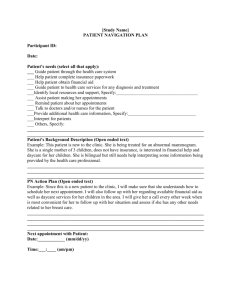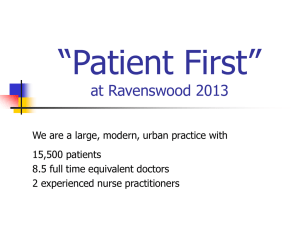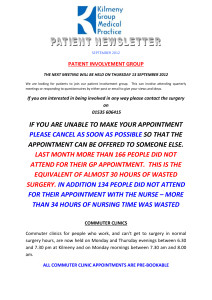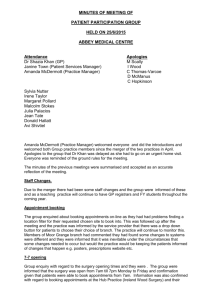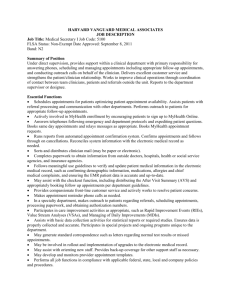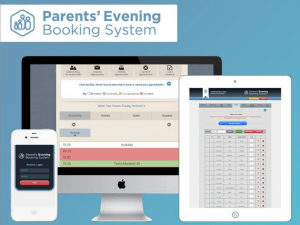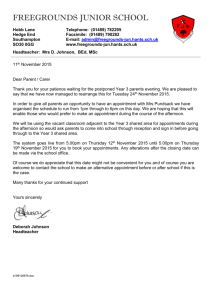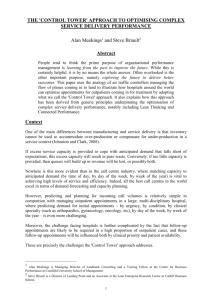PPG Minutes 19th June 2014 - Low Moor Medical Practice
advertisement
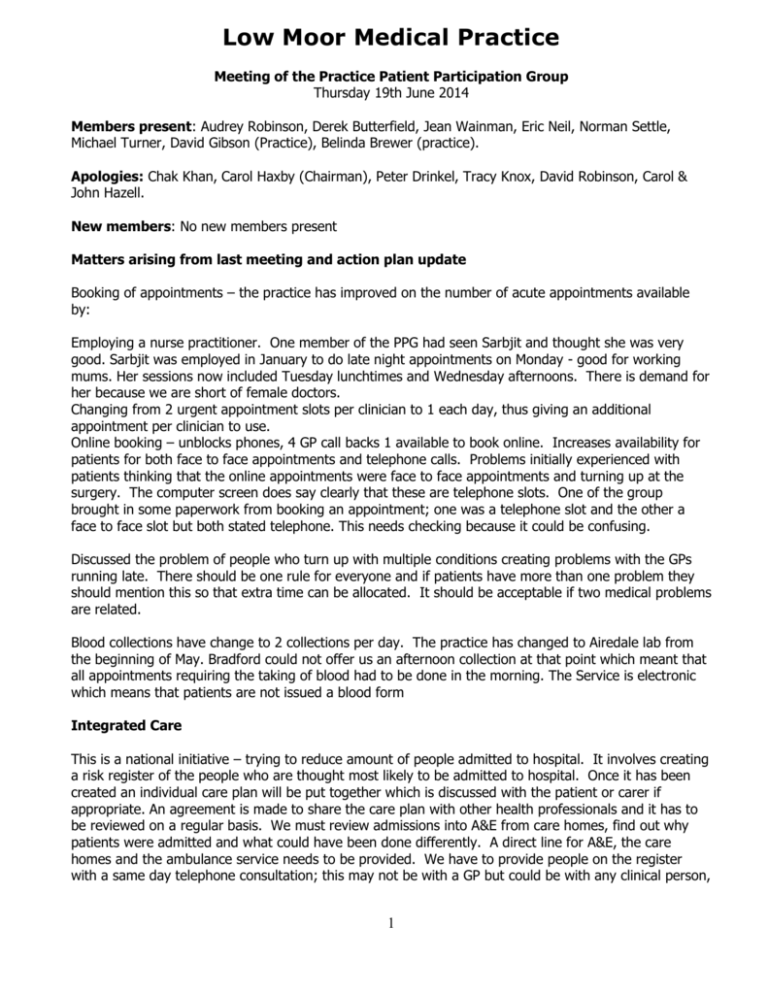
Low Moor Medical Practice Meeting of the Practice Patient Participation Group Thursday 19th June 2014 Members present: Audrey Robinson, Derek Butterfield, Jean Wainman, Eric Neil, Norman Settle, Michael Turner, David Gibson (Practice), Belinda Brewer (practice). Apologies: Chak Khan, Carol Haxby (Chairman), Peter Drinkel, Tracy Knox, David Robinson, Carol & John Hazell. New members: No new members present Matters arising from last meeting and action plan update Booking of appointments – the practice has improved on the number of acute appointments available by: Employing a nurse practitioner. One member of the PPG had seen Sarbjit and thought she was very good. Sarbjit was employed in January to do late night appointments on Monday - good for working mums. Her sessions now included Tuesday lunchtimes and Wednesday afternoons. There is demand for her because we are short of female doctors. Changing from 2 urgent appointment slots per clinician to 1 each day, thus giving an additional appointment per clinician to use. Online booking – unblocks phones, 4 GP call backs 1 available to book online. Increases availability for patients for both face to face appointments and telephone calls. Problems initially experienced with patients thinking that the online appointments were face to face appointments and turning up at the surgery. The computer screen does say clearly that these are telephone slots. One of the group brought in some paperwork from booking an appointment; one was a telephone slot and the other a face to face slot but both stated telephone. This needs checking because it could be confusing. Discussed the problem of people who turn up with multiple conditions creating problems with the GPs running late. There should be one rule for everyone and if patients have more than one problem they should mention this so that extra time can be allocated. It should be acceptable if two medical problems are related. Blood collections have change to 2 collections per day. The practice has changed to Airedale lab from the beginning of May. Bradford could not offer us an afternoon collection at that point which meant that all appointments requiring the taking of blood had to be done in the morning. The Service is electronic which means that patients are not issued a blood form Integrated Care This is a national initiative – trying to reduce amount of people admitted to hospital. It involves creating a risk register of the people who are thought most likely to be admitted to hospital. Once it has been created an individual care plan will be put together which is discussed with the patient or carer if appropriate. An agreement is made to share the care plan with other health professionals and it has to be reviewed on a regular basis. We must review admissions into A&E from care homes, find out why patients were admitted and what could have been done differently. A direct line for A&E, the care homes and the ambulance service needs to be provided. We have to provide people on the register with a same day telephone consultation; this may not be with a GP but could be with any clinical person, 1 Low Moor Medical Practice a nurse here, district nurse. The patient should be provided with a phone call back on the same day which could result in them coming in to the practice. Nominated GP for the over 75’s Patients over 75 should have a nominated GP to coordinate their care. This may not be the GP that they see most often. They can see any GP, not only the nominated GP. All the doctors will be nominated GP’s. Everyone over 75 will be informed. This could be on repeat prescriptions, notices in waiting room, texts and letters. Discussed that registered GP is always a partner but this could be different to the nominated GP. It was asked about how we deal with patients that are inappropriately dropped off at A&E, i.e. turning up with tooth ache but had said chest pain too but this is not the case. It backs up ambulance service for hours. We do not get to know about things like this. The ambulance service are fined for delays in getting patients to A&E. The ambulance service and A&E will have a direct line to contact the surgery in future and we would expect them to contact us if this kind of problem happens. Vitrucare Vitrucare is a pilot scheme being trialled on hypertensive patients. Patients will receive a computer programme which will provide information about their condition and factors that impact on it. Blood Pressure measurements can be entered on to the programme and the Practice can dial in to access the results. This means patients can be monitored without being seen at the practice. The patient will need to have a home blood pressure monitor. This will hopefully avoid white coat syndrome. The clinician will agree goals with the patient so they can utilise self care at home. Patients that are concerned with their results can discuss them with a clinician. Eventually once hypertension is up and running the practice will move on to other long term conditions. The practice will seek to work patients that are motivated to start with and if it works then it will be rolled out to everyone else. The patients initially selected will be patients who have no other long term problems, between 55 and 65 years of age and have online facilities at home. Friends and Family This initiative will be introduced around Christmas time to Bradford. It involves recommendation cards asking if patients would recommend the surgery to Friends and Family. More on this to follow. Frequent Attendees The practice has produced a list of patients who have attended the practice more than 25 times in the last year. There were 140 people on the list. This includes Telephone consultations and GP appointments. One patient was identified as attending 47 times. The challenge is to treat everyone fairly. Some of these patients require frequent care. Perhaps some of these patients should receive telephone calls once a month to try cut down on attendance. It was asked if we run lists each month on physical appointments and telephone appointments and compare them. Currently we only produce appointment lists for DNA’s. We discussed triaging appointments but would this save time? Telephone triage or net triage is good for non urgent problems, emailing a problem could also be an option. To be discussed with GP’s. 2 Low Moor Medical Practice AOB The question was raised that some residents were asking if there is any possibility of the doctors taking over the post office at the corner of South Street for people who struggle to get to surgery. There are many clinical problems that could arise but David agreed to discuss with partners. It was discussed that there are the same problems in other areas such as Scholes and Wyke and branches cannot be open everywhere to accommodate everyone. The surgery is on a bus route so very accessible. Also there would be limited staff to deal with all the problems that can occur in a branch surgery. Terminology on Prescriptions. It was discussed that not everyone knows what abbreviations mean when written on prescriptions i.e. TCI. In future could the message be written in full? Patients are unaware before collecting their prescription from the chemist if items are going to be missing and this causes problems if for instance they are running out and they have been told to come in. Patient stated he was told to come in before he could get his tablets and when he got here the GP said it was not necessary for him to be seen. What can be done to stop this happening? Patient mentioned that they had been booked for a blood test but then was offered Friday blood clinic which they attended. Patient then received a text saying the DNA’d their appointment. Original appointment must not have been cancelled, how can this be avoided in future? Date of next meeting 18th September. 3
